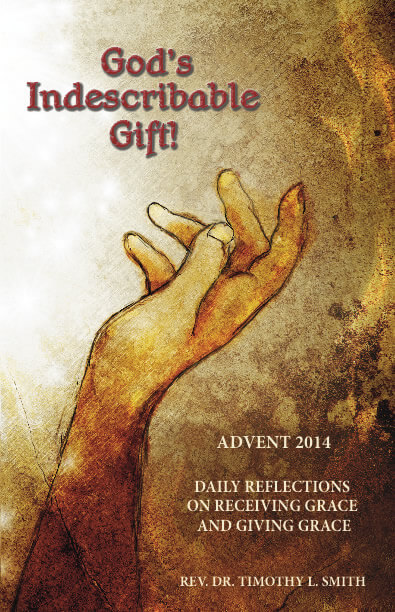
II Corinthians 9:15
What can one say to the “surpassing grace of God” except to say, “Thanks”? The great Dutch theologian G. C. Berkouwer observed that the essence of Christian theology is grace, and the essence of Christian living is gratitude. Throughout the New Testament we see the wonderful synergy of grace and gratitude. Not “shoulds”, “oughts”, “musts”, and “don’ts”, but lives filled with “Thanks be to God for his indescribable gift!”
The apostle Paul cannot help but weave together grace and gratitude in today’s concluding Scripture. As we begin receiving the surpassing grace of God we are moved to the deepest gratitude. Not fear, not guilt, not shame, but gratitude. It is impressive that the Greek word translated as “Thanks” is the word charis, the Greek word for “grace”. Paul knows that a heart stirred and awakened by “grace” (charis) is moved to “thanks” (charis).
How different is life energized and oriented to grace from life energized and oriented to duty. How different is life built on what God gives us than a life built on what we give to God. We can never write on a piece of paper the things we can do for God, then stand on the edge of infinity and say, “Lord, you need this, and here’s what I can do for you.”
God needs nothing, so when God gives to us He gives without any self-seeking. He gives because we are needy and because He delights in our joy in receiving. God doesn’t exchange gifts at Christmas, He gives! “For you know the grace of our Lord Jesus Christ, that though he was rich, yet for your sakes he became poor, so that you through his poverty might become rich” (II Corinthians 8:9).
Right about this time during Advent I like to read O. Henry’s lovely short story, The Gift of the Magi. It’s a tale about a poor married couple, Jim and Della, who live in a meager flat in New York City in the early 1900’s. As Christmas approaches each desperately wants to buy a present for the other, but doesn’t know how. They have only two possessions of value between them: Jim’s platinum watch handed down from father and grandfather, and Della’s gorgeous hair reaching down to her knees.
Secretly Della sells her hair to buy a platinum chain for Jim’s treasured watch, while Jim sells his watch to buy jeweled combs for Della’s beautiful hair. On Christmas Eve Jim and Della discover that each is left with a gift that cannot be used, but learns how precious their love really is. Thus, O. Henry ends his story:
And here I have lamely related to you the uneventful chronicle of two foolish children in a flat who most unwisely sacrificed for each other the greatest treasures of their house. But in a last word to the wise of these days let it be said that of all who give gifts these two were the wisest. Of all who give and receive gifts, such as they are wisest. Everywhere they are wisest. They are the Magi.
God loves you more deeply than you can ever imagine, beyond your wildest dreams and hopes. God doesn’t just give us love, “God is love” (I John 4:8). So it’s good to remember this Christmas, “rather than receiving something God needs but doesn’t have, what God receives is delight – the lover’s delight at the sight of the beloved whose very existence is that lover’s gift.” (Miroslav Volf, Free of Charge)
REFLECTION
- G. C. Berkouwer suggests that “the essence of Christian living is gratitude.” Do you agree or disagree? Why?
- What do you see as the relationship between grace and gratitude?
- What feelings stir within you to think that God loves you more than you can imagine?


